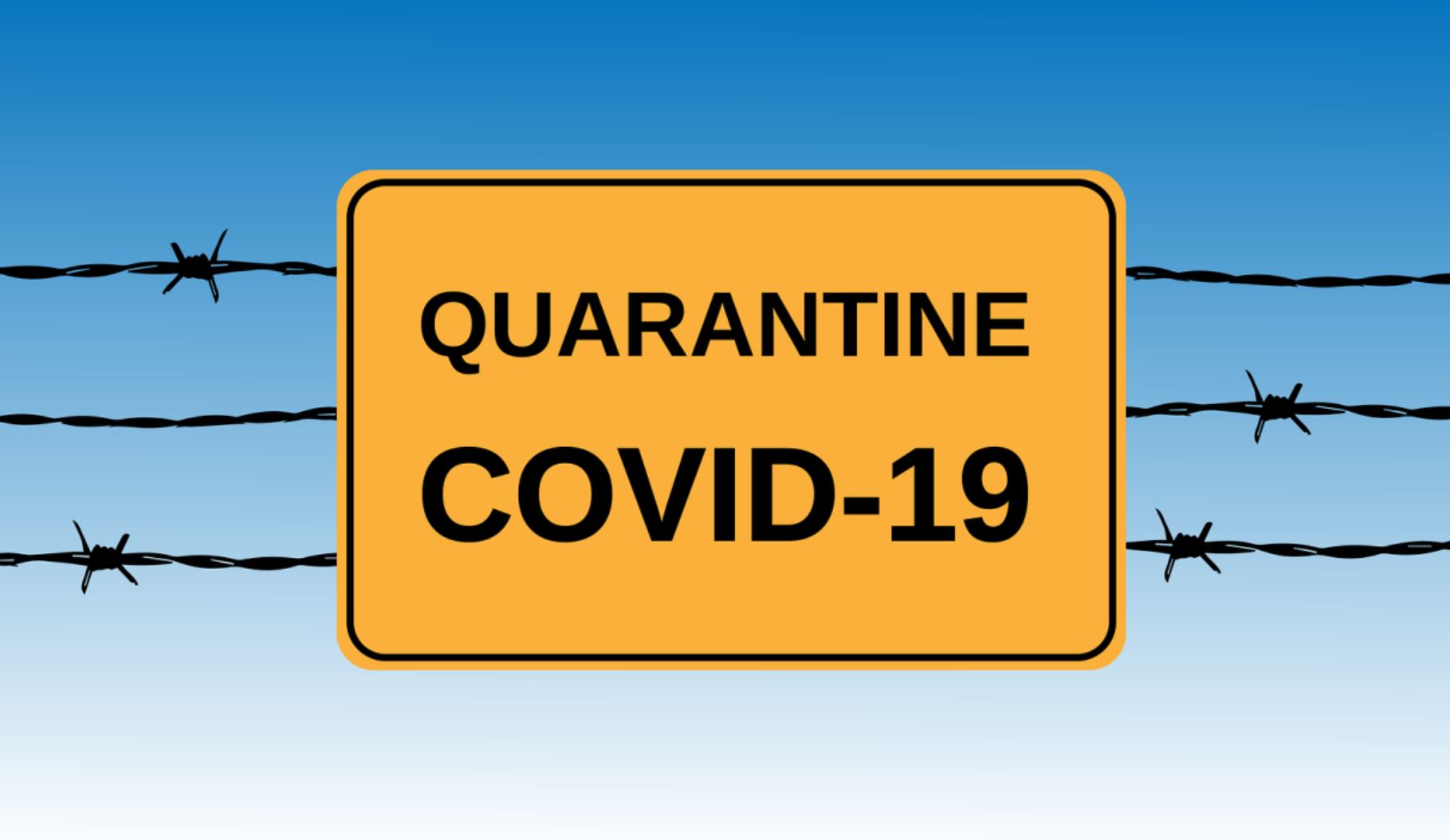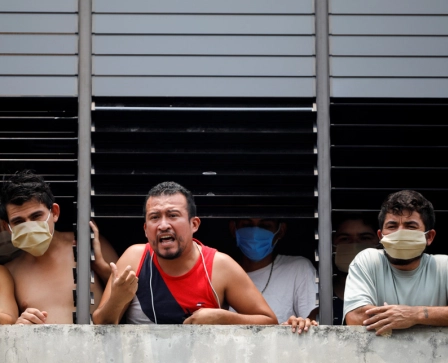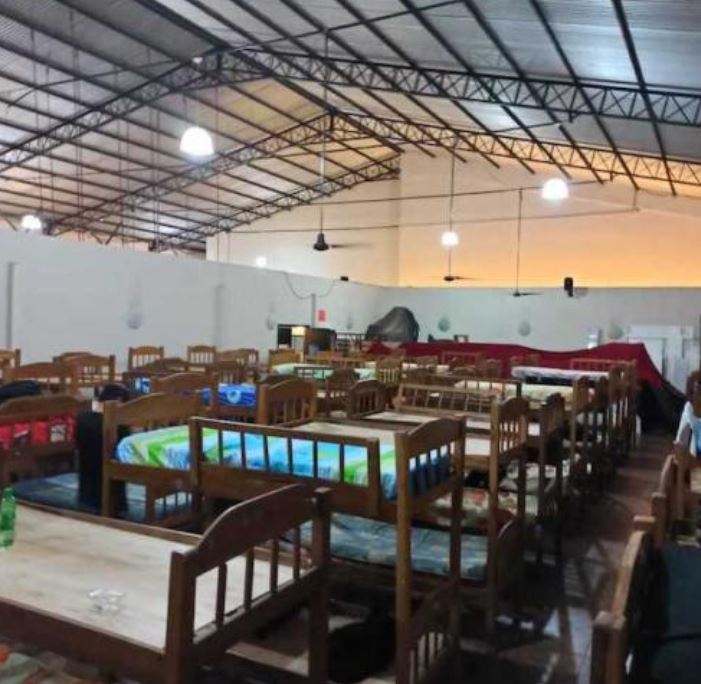 Activist Post Editor’s Note: U.S. immigration detention centers are often the prime focus of people’s outrage; and, to be sure, there are plenty of reasons for that, including recent accusations of forced sterilizations (See: “Shocking Number of Women in ICE Facility Were Sterilized Against Their Will, Nurse Reveals.”
Activist Post Editor’s Note: U.S. immigration detention centers are often the prime focus of people’s outrage; and, to be sure, there are plenty of reasons for that, including recent accusations of forced sterilizations (See: “Shocking Number of Women in ICE Facility Were Sterilized Against Their Will, Nurse Reveals.”
However, it’s important to remember that the government response to COVID is truly a global outrage and has resulted in countless other grave abuses of basic human rights beyond the U.S. As you’ll read below, people in various parts of Latin America have been detained in warehouses, sports stadiums and other makeshift facilities. Often they are people who already have suffered from the economic fallout and have been caught up in various dragnets as they flee or return from oppressive conditions. It could make a person wonder if it’s really all about #SavingLives.
Op-Ed by Duncan Tucker – CuencaHighLife, Ecuador
Since the outbreak of the COVID-19 pandemic in March, authorities in Venezuela, El Salvador and Paraguay have held tens of thousands of people in inadequate state-run quarantine centres without sufficient safeguards against human rights violations, in what could amount to ill-treatment and risk the detentions becoming arbitrary, Amnesty International said in a new report published today.
When protection becomes repression: Mandatory quarantines under COVID-19 in the Americas documents how the authorities in three countries have disproportionately held migrants, refugees, people returning to their countries of origin, and low-income communities in state-run quarantines, often in unsanitary and sometimes inhumane conditions without adequate food, water and medical care, which may amount to ill-treatment. The appalling conditions stand to make them counterproductive spaces where people are at risk of contracting COVID-19.
“In many parts of the world, authorities have asked people to stay at home or voluntarily quarantine to mitigate the risk of contracting COVID-19. But when states lock up tens of thousands of people without ensuring each detention is necessary and proportionate, detain them in appalling conditions under military or police supervision, and discriminate against them or use the quarantine as punishment, they convert a public health intervention into a punitive and repressive tactic,” said Erika Guevara-Rosas, Americas director at Amnesty International.

A man in an El Salvador quarantine center complains that he has been held for weeks with no explanation of when he will be released.
By the end of August, according to government figures, Venezuelan authorities had mandatorily quarantined some 90,000 Venezuelans who had returned home after being left jobless and homeless in neighboring countries such as Colombia and Peru, only to be sent to unsanitary and sometimes inhumane quarantine centers under military control.
While El Salvador and Paraguay had largely closed their state-run quarantines or reduced them in scale by the end of August, President Bukele’s government had quarantined more than 16,000 people, including those accused of breaking the mandatory national lockdown, people returning from overseas, or those suspected of having been in contact with anyone who had tested positive for COVID-19.
As of late June, authorities in Paraguay had also mandatorily quarantined some 8,000 people, mainly Paraguayans who had returned to the country after losing their jobs in neighboring Brazil’s informal sector as COVID-19 lockdowns were enforced there.
Amnesty International reviewed and verified dozens of videos available on social media or sent to the organization directly, mostly filmed by people placed in mandatory quarantine centres including warehouses, sports stadiums and other facilities, describing the conditions in which they were being held. It also carried out 14 phone interviews, reviewed dozens of newly passed laws, policies, and protocols related to lockdowns and the implementation of the mandatory quarantines, as well as court documents, and reports by independent monitors and journalists.
The organization received information in all three countries that people have been quarantined often for well beyond the 14 days currently recommended by the WHO, and sometimes for more than a month. The people held in quarantine did not have sufficient access to information about how long they would be detained for or the scientific criteria that would be used at any given time to determine their discharge from quarantine or isolation. This constitutes a violation of their right to information and the requirement under international human rights law that any deprivation of liberty, even when in pursuit of the protection of public health, must be provided by law and be necessary, proportionate and time-bound.
Authorities should only hold people in state custody when alternative, less invasive measures, such as voluntary quarantine measures and education campaigns, have failed. If they do mandatorily quarantine people, they must provide the appropriate conditions, safeguard against human rights violations and ensure that quarantines are not used discriminatorily to target specific communities.
“While governments have had to respond quickly to an unprecedented pandemic, Amnesty International found their implementation of state-run mandatory quarantines was defined by arbitrariness, coupled with police and military enforcement,” said Erika Guevara-Rosas.
“Instead of providing the appropriate conditions and safeguards against human rights violations, authorities in Venezuela and El Salvador, in particular, have converted a public health intervention into a punitive response, disproportionately impacting low-income communities, and refugees and migrants returning to their countries of origin.”
In El Salvador, for example, the Minister of Justice and Security warned in April that people who broke the national lockdown would be placed in a containment centre, “far from their families and run the risk in those centres of quarantine of also contracting the virus.” This indicated that quarantine was seen as a punishment and that the authorities were fully aware that centres lacked the appropriate standards to prevent contagion.
“I’d like to forget all this, but I can’t,” Ana Cristina told Amnesty International after describing how she had spent 40 days sleeping on a dirty mattress on the floor in a quarantine facility in El Salvador. She was taken there in mid-April by the police who accused her of breaking the national lockdown when she was out buying groceries and medicine, an activity that was considered essential and allowed at the time of her detention.
The most openly disturbing example of state-sponsored campaigns of stigma and discrimination has come from Venezuela. In recent months, while requiring that all returning Venezuelans be placed in mandatory quarantine facilities, high level officials of President Nicolás Maduro’s government have simultaneously described Venezuelan refugees returning from Colombia as “biological weapons” sent to infect people living in Venezuela. Senior officials have also described those returning as “traitors.”
This narrative, based on the returning Venezuelans’ perceived political views and deliberate association with COVID-19, coupled with their automatic placement in state-run mandatory quarantines, raises concerns that their deprivation of liberty was discriminatory and arbitrary.
Amnesty International is calling on governments who detain people in state-run quarantines for public health purposes to immediately grant humanitarian organizations and independent human rights monitors access to these centres so they can monitor the conditions, safeguard against ill-treatment and provide urgently needed water, food and other supplies to comply with international human rights obligations and WHO guidelines on quarantine settings.
Authorities must also prevent indefinite detentions. They must ensure time limits for mandatory quarantine and isolation are limited to the minimum period necessary, as informed by evolving scientific evidence and best practice and given clear information about the length and process of their detention.
As the COVID-19 pandemic continues, and countries across the Americas face the possibility of repeated lockdowns, this initial research into state-run quarantines highlights the need for authorities to avoid resorting to coercive, punitive and discriminatory approaches as they implement public health measures.
“We know from other pandemics that punitive approaches do no protect communities and associating specific communities with a virus only drives stigma and discrimination. Instead, human rights-based approaches that empower people with the knowledge they need to protect their own health and providing them with the resources and support they need to comply with voluntary measures, have historically proven more effective,” said Erika Guevara-Rosas.
Credit: Relief Web
Top image: Pixabay
Subscribe to Activist Post for truth, peace, and freedom news. Send resources to the front lines of peace and freedom HERE! Follow us on SoMee, HIVE, Parler, Flote, Minds, and Twitter.
Provide, Protect and Profit from what’s coming! Get a free issue of Counter Markets today.


Be the first to comment on "Quarantine as Punishment: Thousands of Latin Americans are Held in “Police State” Detention Centers"